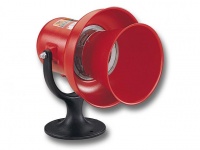Model A
| Model A | |
[[File: |200px]] |200px]]
| |
| Company | Federal Signal Corporation |
|---|---|
| Produced | 1918-~2007 [1] |
| Type | Electromechanical |
| Documentation | Manual Product sheet |
The Model A is a siren produced by the Federal Signal Corporation. It is currently the oldest siren Federal Signal produces. From 1918 to the early 1970's, the Model A used a "conical" skirt design that was changed to a slightly larger intake and a flanged outer skirt similar the the Model D; also, the ID plate was mounted on the outer skirt from the beginning of production to the mid Federal Sign & Signal era, where it was relocated to the motor cover. The earliest Model A's (known as the "Type A") used sleeve bearings with oil sumps sticking out of the motor housing and had stators without finger guards. Next, the stator recieved finger guards and the sumps were replaced with sealed ball bearings. The Model A remains unchanged for quite some time after that; the only changes being the movement of the ID plate and the removal of the small hole in the mounting fork intended for a way to feed wiring to a junction box. It was then in 1970 that the Model A recieved a much needed face lift, a new horn design. This design has since remained unchanged, as has the siren itself; the only change being the removal of the metal ID plates in favor for stickers displaying model information. While in production, the Model A has had many "brothers and sisters" of sorts. While not directly related, the Model D was often advertised along side the Model A. The was also a Model B9, while not using the same chopper as the Model A, was a smaller version. In addition, there was a Model J, that was essentially the Model A with a larger skirt and some later models having 240/250 volt motors. The Model J paved the way for the still-in-production Model L, which is overall a Model D with a newer housing and available with a 240/250 volt motor. There was also a Model AV, a vertically mounted Model A with a ¾" pipe in the intake for mounting purposes. Finally, there was also a coded Model A which had a damper mounted in the intake to produce pulsed signals.
Examples
![]() Model A in Hummelstown, Pennsylvania sounding for it's weekly test.
Model A in Hummelstown, Pennsylvania sounding for it's weekly test.